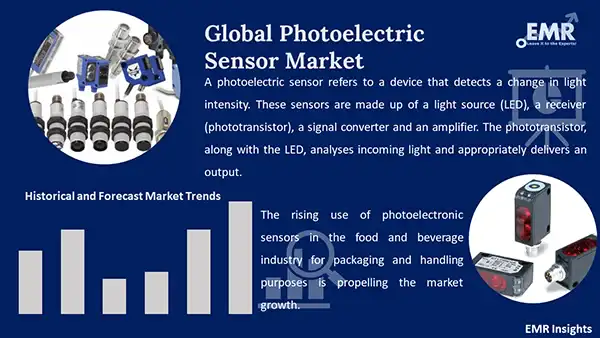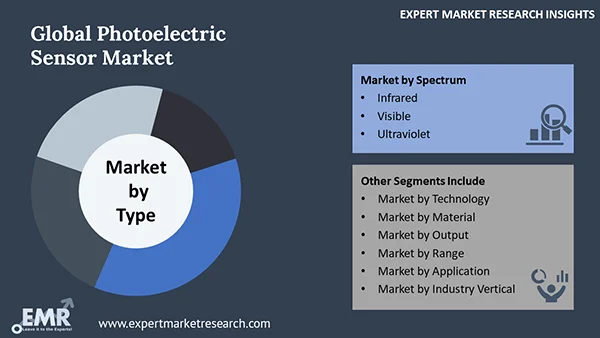
Consumer Insights
Uncover trends and behaviors shaping consumer choices today
Procurement Insights
Optimize your sourcing strategy with key market data
Industry Stats
Stay ahead with the latest trends and market analysis.
The global photoelectric sensor market attained a value of about USD 2.14 Billion in 2025. The market is further expected to grow at a CAGR of 7.60% during the forecast period of 2026-2035 to reach approximately USD 4.45 Billion by 2035.
Base Year
Historical Period
Forecast Period
Compound Annual Growth Rate
7.6%
Value in USD Billion
2026-2035
*this image is indicative*
The global market for photoelectric sensors is being driven by the emerging trends encouraging automation across various industry verticals. Photoelectric sensors are able to detect objects of different materials and sizes and are hence deployed in the industrial sector to achieve efficiency and accuracy. The food and beverage segment is one of the largest end use sectors of photoelectric sensors. This can be attributed to the growing focus towards automation by minimising human intervention in material handling and packaging.

Read more about this report - REQUEST FREE SAMPLE COPY IN PDF
Photoelectric sensors for bottle-cap alignment and orientation, counting packed objects in a conveyor belt, and eliminating the risk of contamination that may arise from the human touch are the various factors that are significantly boosting the food and beverage sector, thereby propelling the market growth of photoelectric sensor. In addition to this, the rising adoption of photoelectric sensors in logistics automation that rely on position and object-sensing for efficient and safe operations is further catalysing the market growth of photoelectric sensor.

Read more about this report - REQUEST FREE SAMPLE COPY IN PDF
A photoelectric sensor refers to a device that detects a change in light intensity. These sensors are made up of a light source (LED), a receiver (phototransistor), a signal converter and an amplifier. The phototransistor, along with the LED, analyses incoming light and appropriately delivers an output.
The market, based on technology, can be divided into:
On the basis of type, the market can be segmented into:
The market, based on material, can be classified into:
Based on spectrum, the market can be categorised into:
The market division based on output are:
On the basis of range, the market can be segmented into:
The market, based on application, can be divided into:
On the basis of industry vertical, the market can be categorised into:
The EMR report looks into the regional markets of photoelectric sensor like:
The growth in the market for photoelectric sensor is anticipated to be driven by the gradual shift towards automation in the automotive industry. The emergence of electric vehicles and self-driven cars are augmenting the demand for photoelectric sensors for the manufacturing of these vehicles, thereby propelling the market growth. During the assembly process, photoelectric sensors are used to monitor the transportation of individual components down the production line, which assists in diminishing the risk of human error.
Additionally, photoelectric sensors are used in automatic cars for measuring distance and evaluating the position of objects, such as pedestrians or traffic lights, by ensuring the safety of the driver as well as the objects outside the vehicle. Thus, the flourishing automotive industry with the development of new technologies is expected to be a key driving factor for the market growth of photoelectric sensor over the forecast period.
The report presents a detailed analysis of the following key players in the global photoelectric sensor market, looking into their capacity, market share, and latest developments like capacity expansions, plant turnabouts and mergers and acquisitions:
The comprehensive report looks at the micro and macro aspects of the industry. The EMR report gives an in-depth insight into the market by providing a SWOT analysis as well as an analysis of the Porter’s Five Forces Model.




*While we strive to always give you current and accurate information, the numbers depicted on the website are indicative and may differ from the actual numbers in the main report. At Expert Market Research, we aim to bring you the latest insights and trends in the market. Using our analyses and forecasts, stakeholders can understand the market dynamics, navigate challenges, and capitalize on opportunities to make data-driven strategic decisions.*
Get in touch with us for a customized solution tailored to your unique requirements and save upto 35%!
The global photoelectric sensor market attained a value of nearly USD 2.14 Billion in 2025.
The market is projected to grow at a CAGR of 7.60% in the forecast period of 2026-2035.
The market is estimated to witness a healthy growth in the forecast period of 2026-2035 to reach about USD 4.45 Billion by 2035.
The major market drivers are the increasing trend of automation and the growing use of photelectric sensors in the food and beverage sector.
The key trends guiding the market growth include the rising adoption of photoelectric sensors in logistics automation, the emergence of autonomous vehicles, and the increasing integration of innovative technologies in the automotive sector.
The major regional markets for photoelectric sensor are North America, Latin America, the Asia Pacific, Europe, and the Middle East and Africa.
The different technologies considered in the market report are thru-beam, retro-reflective, and diffused.
The various types of photoelectric sensors are laser photoelectric sensor and fibre optics photoelectric sensor.
The different materials of photoelectric sensors are metal and plastic.
The major segments based on spectrums of photoelectric sensor considered in the market report are infrared, visible, and ultraviolet.
Analogue and digital are the significant market segmentations based on outputs of photoelectric sensors.
The major ranges of photoelectric sensors are less than 100 mm, 100 - 1,000 mm, 1,000 - 10,000 mm, and more than 10,000 mm.
The significant applications of photoelectric sensors are safety, edge detection, film thickness detection, height and level measurement, and position detection, among others.
The different market verticals of photoelectric sensors are consumer electronics, aerospace and defence, automotive, food and beverages, and healthcare, among others.
The major players in the market are OMRON Corporation, Autonics Corporation, Panasonic Corporation, KEYENCE CORPORATION, Rockwell Automation, Inc, and SICK AG, among others.
Explore our key highlights of the report and gain a concise overview of key findings, trends, and actionable insights that will empower your strategic decisions.
| REPORT FEATURES | DETAILS |
| Base Year | 2025 |
| Historical Period | 2019-2025 |
| Forecast Period | 2026-2035 |
| Scope of the Report |
Historical and Forecast Trends, Industry Drivers and Constraints, Historical and Forecast Market Analysis by Segment:
|
| Breakup by Technology |
|
| Breakup by Type |
|
| Breakup by Material |
|
| Breakup by Spectrum |
|
| Breakup by Output |
|
| Breakup by Range |
|
| Breakup by Application |
|
| Breakup by Industry Vertical |
|
| Breakup by Region |
|
| Market Dynamics |
|
| Competitive Landscape |
|
| Companies Covered |
|
| Report Price and Purchase Option | Explore our purchase options that are best suited to your resources and industry needs. |
| Delivery Format | Delivered as an attached PDF and Excel through email, with an option of receiving an editable PPT, according to the purchase option. |
Datasheet
One User
USD 2,499
USD 2,249
tax inclusive*
Single User License
One User
USD 3,999
USD 3,599
tax inclusive*
Five User License
Five User
USD 4,999
USD 4,249
tax inclusive*
Corporate License
Unlimited Users
USD 5,999
USD 5,099
tax inclusive*
*Please note that the prices mentioned below are starting prices for each bundle type. Kindly contact our team for further details.*
Flash Bundle
Small Business Bundle
Growth Bundle
Enterprise Bundle
*Please note that the prices mentioned below are starting prices for each bundle type. Kindly contact our team for further details.*
Flash Bundle
Number of Reports: 3
20%
tax inclusive*
Small Business Bundle
Number of Reports: 5
25%
tax inclusive*
Growth Bundle
Number of Reports: 8
30%
tax inclusive*
Enterprise Bundle
Number of Reports: 10
35%
tax inclusive*
How To Order

Select License Type
Choose the right license for your needs and access rights.

Click on ‘Buy Now’
Add the report to your cart with one click and proceed to register.

Select Mode of Payment
Choose a payment option for a secure checkout. You will be redirected accordingly.
Gain insights to stay ahead and seize opportunities.

Get insights & trends for a competitive edge.

Track prices with detailed trend reports.

Analyse trade data for supply chain insights.

Leverage cost reports for smart savings

Enhance supply chain with partnerships.

Connect For More Information
Our expert team of analysts will offer full support and resolve any queries regarding the report, before and after the purchase.
Our expert team of analysts will offer full support and resolve any queries regarding the report, before and after the purchase.
We employ meticulous research methods, blending advanced analytics and expert insights to deliver accurate, actionable industry intelligence, staying ahead of competitors.
Our skilled analysts offer unparalleled competitive advantage with detailed insights on current and emerging markets, ensuring your strategic edge.
We offer an in-depth yet simplified presentation of industry insights and analysis to meet your specific requirements effectively.
Share